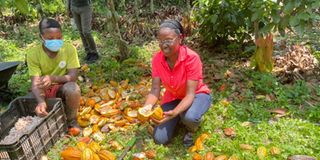How Anyoti buys cocoa at premium prices for export

Pamella Anyoti, managing director of Sunshine Agro Products Uganda Limited displays cocoa. There is a huge gap of value addition. PHOTO/courtesy
What you need to know:
While Anyoti exports raw cocoa through a Swiss trader due to limited production capacity, she dreams of owning a chocolate factory Christine Kasemiire writes.
Her sweet tooth for quality chocolate drove her to venture into cocoa planting. Over a decade ago, Pamella Anyoti Peronaci, started Asante Mama brand and is now the managing director of Sunshine Agro products Limited, an agribusiness company.
“I am super passionate about chocolate because living in Belgium where there is a variety of chocolate and understanding very well that the primary raw material comes from Africa, I asked myself what I can do about it,” she says.
After analysing the market potential of the plant in and outside Uganda, she embarked on the project. She now waits on harvest from more than 300 acres of land painted in cocoa trees in Buwama along Masaka Road.
“There is a huge potential and I am always starting from the market side. The number of people who consume the final product in all of its format whether it is chocolate, cocoa butter or oil or powder, there is a huge market which is only going to grow,” she explains.
Some countries like China, she adds, have started consuming more chocolate.
Anyoti has also empowered 1,800 out growers especially women from whom she purchases cocoa to boost her production capacity.
It is from these farmers that her company name Asante Mama which stands for ‘thank you mother’ was coined. It was in appreciation of her role in improving their livelihoods by purchasing the cocoa at a slightly higher rate than the other market dealers around. She has been awarded with multiple awards across the globe for her role in empowering farmers.
Mr Vincent Serwanga, a small holder cocoa farmer, says Sunshine agro product limited offers much more competitive prices compared to middle men which has raised his earnings, enabling them to live sustainably.
“I earn above Shs400,000 which has greatly increased my earnings to take care of my family,” he notes.
Challenges
“If you are thinking about immediate returns, this is probably not a crop for you,” she warns.
You can take about 10 years to break even from planting cocoa on a farm like hers. With fewer acres, it can take between three and five years for profitability.
This has presented a challenge in acquiring credit especially from commercial banks fueled by limited understanding of the crop. Yet, there are minimal avenues for her to attain cheap patient capital. Development partners such as the Food and Agriculture Organisation have come to the farmers’ rescue.
Mr Antonio Querido, country representative Food and Agriculture Organisation said they would ascertain how to support the local community especially farmers to be part of a value chain that can attract additional and stable incomes to mitigate poverty in rural settings.
In addition, there is limited understanding in this economy among farmers about the actual benefits of the crop because it is long term and very capital intensive.
Ms Anyoti who grows the cocoa on 80 acres out of the 320 acres of farm land projects to earn $100,000 (Shs366 million) during peak harvest come October.
Limitation of capital and adequate capacity of cocoa is still inhibiting her from adding value to cocoa.
However, progress is being made in this effort such as building the factory house, selection of machinery and expanding production of cocoa from both her farm and increasing outgrowers.
Potential of cocoa
According to trade economics, cocoa is traded on New York Mercantile Exchange (NYMEX) and the Intercontinental Exchange (ICE) in London. The prices in New York are based on the South-Asian market and prices in London are based on cocoa from Africa. The size of each cocoa contract on the NYMEX is 10 metric tonnes. The biggest producers of cocoa are Ivory Coast and Ghana which together account for more than 60 per cent of the world’s output. Other major producers include: Indonesia, Nigeria, Cameroon, Ecuador and Brazil.
Rising cocoa exports
Data from the Bank of Uganda indicates that cocoa bean exports from Uganda have been increasing over the years, drawing into the country additional foreign currency.
The exports have increased from $55m (Shs201b) in 2015 to $99m (Shs363b) last year.
“Cocoa in Uganda has no problem with cadmium which is a big problem for the cocoa that is coming from the Caribbean region and the European Union is putting a lot of restrictions on the amount of cadmium that can be in the crop. It is a heavy metal that is naturally in the soil. This gives us a huge opportunity to benefit from cocoa,” she explains.




